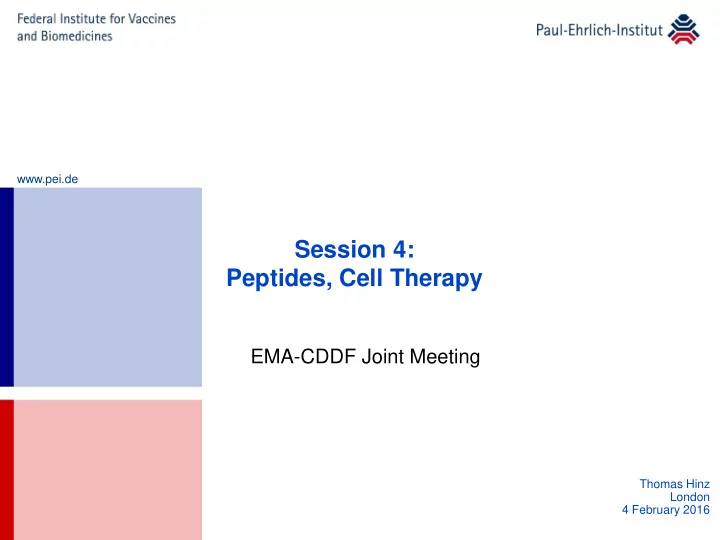

www.pei.de Session 4: Peptides, Cell Therapy EMA-CDDF Joint Meeting Thomas Hinz London 4 February 2016
DISCLAIMER The following is my personal views which are not necessarily reflecting the official position of the Paul Ehrlich Institute Thomas Hinz
Anti-cancer therapy using therapeutic vaccination Thomas Hinz
Antigens available for therapeutic cancer vaccination Tumor-specific antigens Not encoded in the normal host genome. Arising by somatic mutations (neo-antigens) Tumor-associated antigens Encoded in the normal genome. May be normal differentiation antigens or aberrantly expressed. Their antigenicity depends on overexpression in tumors or the ability to circumvent immunological tolerance Cancer testes antigens Normally expressed in testis, fetal ovaries, and trophoblasts. Can also be expressed in cancer cells. Thomas Hinz
Synthetic peptides are often used for anti-cancer vaccination Thomas Hinz
Sometimes antigens are loaded on/transfected into dendritic cells for therapeutic cancer vaccination Quelle: Zoe Waibler Thomas Hinz
Appoved cancer vaccine Provenge (USA in 2010, EU in 2013; retracted in EU 2015) Leukapheresis Recombinant tumor antigen PAP (Prostatic Acid Phosphatase) • Biological medicinal product • Anti-cancer • New active substance • Industrially manufactured • + 4.1 mo median survival Prostate cancer patient Therapeutische Impfstoffe
Recombinant RNA has become important for anti-cancer immunotherapy and other conditions Coding mRNA Cancer immunotherapy (cancer vaccines), including personalized approaches Direct administration Ex vivo transfection of mRNA into dendritic cells Protein replacement/supplementation therapies (erythropoetin etc.) Prophylactic vaccines (e.g. influneza) Non-coding RNA used as adjuvant in vaccines due to its inherent immunogenicity Thomas Hinz
Principle of mRNA manufacture In vitro transcription GMP Purification, formulation, storage Starting materials: -Recombinant plasmids -Synthetic templates Transcription and following steps is drug substance and drug product manufacture; GMP required Thomas Hinz
To what class of medicine does mRNA belong? Legal definition of Gene therapy (DIRECTIVE 2009/120/EC): Gene therapy medicinal product means a biological medicinal product which has the following characteristics: (a) it contains an active substance which contains or consists of a recombinant nucleic acid used in or administered to human beings with a view to regulating, repairing, replacing, adding or deleting a genetic sequence; (b) its therapeutic, prophylactic or diagnostic effect relates directly to the recombinant nucleic acid sequence it contains, or to the product of genetic expression of this sequence. Gene therapy medicinal products shall not include vaccines against infectious diseases. Thomas Hinz
mRNA medicines are recombinant nucleic acids Sahin, U. 2014. Nat. Rev Drug Discovery Thomas Hinz
Is recombinant mRNA a biological medicinal product? Amongst others 1 Medicinal products developed by means of one of the following biotechnological processes : recombinant DNA technology controlled expression of genes coding for biologically active proteins in prokaryotes and eukaryotes including transformed mammalian cells hybridoma and monoclonal antibody methods. Conclusion Chemical DNA recombination/synthesis of a template followed by in vitro mRNA transcription probably does not yield a biological medicinal product → not gene therapy Use of recombinant plasmids as templates generated by biotechnology, involving bacteria probably yields a biological product → gene therapy 1 3rd paragraph of point 3.2.1.1.b. of Part I of Annex I to Directive 2001/83/EC Thomas Hinz
Most mRNA and peptide immunotherapies will be authorized (mandatory) via the centralized EMA marketing authorization procedure 1 Using recombinant DNA technology Expression in procaryotes and eucaryotes Hybridoma and monoclonal antibody technology Advanced therapy medicinal products (gene therapy, somatic cells, tissue engineered medicines) New active substance to treat acquired immune deficiency syndrome cancer neurodegenerative disorder diabetes auto-immune diseases and other immune dysfunctions viral diseases Orphan medicines (rare diseases, prevalence less than 5/10000) 1 Annex of REGULATION (EC) No 726/2004 Thomas Hinz
Personalized anti-cancer immunotherapy Britten et al. 2013. Nat. Biotechnology 31 Therapeutische Impfstoffe
Actively personalized immunotherapy De novo synthesis of antigens Identify individual mutations Tumor sample Normal cells Individual vaccine x for each patient x Sequence expressed genome Therapeutische Impfstoffe
Risk of immunization with neo-antigens: Immune response towards wild type peptide Caste, J.C.& Kreiter, S. (2012). Cancer Res. 72:1081 Therapeutische Impfstoffe
Actively Personalized Immunotherapy Warehouse Concept Warehouse, off the shelve Biomarker Test Source: Harpreet Singh Therapeutische Impfstoffe
Clinical trials making use of active personalization First-in-human Study Evaluating the Safety, Tolerability and Immunogenicity of i.n. Administration of a Personalized Vaccination With IVAC MUTANOME Vaccine w/o Initial Treatment With RBL001/RBL002 Vaccine in Patients With Advanced Melanoma (NCT02035956). Neo-antigens based on multi-epitope mRNAs First-in-human Clinical Study With RNA-Immunotherapy Combination of IVAC_W_bre1_uID and IVAC_M_uID for Individualized Tumour Therapy in Triple Negative Breast Cancer Patients (NCT02316457). Warehouse and warehouse followed by mutated antigens; mRNA as drug substance A Phase I Trial of Actively Personalized Peptide Vaccinations Plus Immunomodulators in Patients With Newly Diagnosed Glioblastoma Concurrent to First Line Temozolomide Maintenance (NCT02149225). Ware house followed by neo-antigens (mutated) Therapeutische Impfstoffe
Conclusion & Perspective Recombinant mRNA is an important drug substance for cancer immunotherapy mRNA and peptides are currently used for actively personalized immunotherapies Use of neo-antigens for cancer immunotherapy might be associated with less adverse clinical effects as compared to immune checkpoint inhibition by monoclonal antibodies Thomas Hinz
Recommend
More recommend